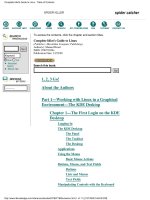Tài liệu The Insider’s Guide to PR: Chapter 1 WORKING IN A PR CONSULTANCY doc
Bạn đang xem bản rút gọn của tài liệu. Xem và tải ngay bản đầy đủ của tài liệu tại đây (142.76 KB, 2 trang )
WORKING IN A PR CONSULTANCY
This chapter tells you a little more about the PR industry and discusses the difference
between in-house PR and PR consultancy. If you already have a good idea about
working in PR then you might want to move on to the next section which discusses
whether you have the right skills.
Those looking for a career in PR can take one of two main routes: by getting a job
within a PR department of a company or organisation, known as in-house PR, or by
finding a position in a PR consultancy.
The PR consultancies in the UK range from US-owned giants, employing thousands
of people worldwide, to privately owned companies operating with only a handful of
full-time staff. The buyers of PR consultancy tend to be in-house PR, marketing or
communications departments of other private businesses or the public sector, like
local authorities.
PR CONSULTANCY: A PROFILE
If you decide to choose the consultancy route, then it’s worth knowing that PR
companies often fall into two categories: full service, where a full range of PR
disciplines are on offer or specialist, where a consultancy might specialise in certain
industries or PR disciplines like crisis management.
WHAT TYPE OF WORK DO PR CONSULTANCIES DO?
The graph below illustrates the different PR disciplines offered by PR consultancies
Source: PRCA Frontline Survey 2001
HOW DOES A CONSULTANCY DIFFER FROM AN IN-HOUSE PR DEPARTMENT?
The following points offer a useful illustration:
• Client Contracts – A consultancy is contracted to deliver bespoke PR services to
any number of companies or ‘clients’ of any discipline. Account teams within a
full service consultancy, for instance, might undertake corporate, consumer,
trade, financial or even crisis management PR according to a client’s individual
needs. (See Chapter 3 for individual category definitions). In-house PR
professionals, in contrast, are the clients, undertaking a PR programme for their
own specific company. In-house PR teams might have to oversee other marketing
functions like advertising and direct marketing.
• Standards – PRCA member consultancies have to meet strict entry criteria and are
bound by codes of practice. In addition the PRCA’s Consultancy Management
Standard (CMS) is an external assessment based on business proficiency and all
members must pass in order to join the trade association. In-house PR
departments are not subject to such PR industry regulations as the Consultancy
Management Standard, although some individuals within the organisation might
be members of the Institute of Public Relations (IPR) which ensures individual
practitioners are bound by professional codes of conduct. In-house PR
departments might also have to work to other standards or codes related to their
own specific industries.
The Insider’s Guide to PR: Chapter 1
Page 3
Kathryn Wyllie
Account Executive
GCI UK
Geography and Foreign Business
Management graduate
“I work in a large professional
consultancy with a fun and friendly
small company feel. I joined a
consultancy because it gives you a
variety of experience across different
client accounts and sometimes
different disciplines. It also gives you
the opportunity to work in a large
team with experienced people you can
learn from.”
General
Consumer
Technology
City/Financial
Public Affairs
Healthcare
Business-to-Business
• Evaluation – PR consultancies, similar to other marketing disciplines, need to
prove the value of their work, and in so doing, justify their fees! They do this
through both internal and external evaluation programmes to assess the success
of a specific project or on-going PR programme. Before a project commences,
evaluation starts at the planning stage using research to establish the client
objectives in order to develop the right strategy. Measurement and evaluation is
then carried out once the programme is completed in order to help a client and
consultancy plan future activity accordingly. For more details, please visit the
evaluation information site, www.pre-fix.org.uk.
WHAT ARE THE BENEFITS OF WORKING IN A CONSULTANCY?
PR consultancy work offers some incredible opportunities for graduates as the
following points make clear:
• Experience – A consultancy offers newcomers to the industry an excellent
grounding in fundamental PR practices. Graduate trainee programmes, in
particular, are an excellent platform from which to gain varied experience with
different sectors and clients. The very nature of in-house PR, on the other hand,
makes it sector specific and offers little room for manoeuvre. For this reason,
many PR professionals move in-house later on in their careers, once they’ve
established their chosen PR specialism.
• Speed – Juggling a range of clients as well as talking to a wide range of audiences,
including the media, means that PR professionals must think fast and be ready
for anything.
• Team Spirit – A successful consultancy depends on team work. Different clients
are handled by different account teams which are usually made up of five or six
people of varying experience. On average, a PR account executive would work on
four separate accounts.
• Variety – A typical day might start with a client meeting in the morning, a
photoshoot after lunch and then press release writing for a new product launch.
Often you will be required to liaise with external suppliers like designers or
mailing houses. This is all invaluable experience in recognising where PR fits into
the broader marketing picture
• Financial Benefits – The sort of PR salary you could expect is detailed in Chapter
4, however it is worth noting some of the other financial benefits consultancies
can provide. Many consultancies offer share options in the company as well as
pension schemes and health insurance. It is a good idea to investigate the
benefits on offer when searching for a job.
• Entrepreneurship – PR attracts bright, talented people with strong individual
personalities. Many PR practitioners set up their own private consultancies and
some larger firms offer their own budding “Richard Bransons” a chance to start
up specialist divisions or subsidiary companies. The opportunities for
entrepreneurship are plentiful in this young industry.
• Social Life – Having explored the various career and financial benefits of
consultancy work, what you really want to know is the kind of social life you can
expect. Consultancies attract like-minded, young people and consequently foster
a fun and stimulating environment in which to work. Some of the larger
consultancies have their own bars or break-out rooms, or at least beer fridges, and
actively encourage evening socialising.
The Insider’s Guide to PR: Chapter 1
Page 4
Derek Harris
Senior Account Manager
Republic
PR and Business graduate
“I have always preferred to work in a
consultancy than in-house. The fact
that you have a variety of clients
helps you learn new approaches to
day-to-day PR techniques; writing,
selling-in stories, managing staff,
working out strategies and inter-
personal client skills. However, you
don’t always feel like this when
you’ve got to juggle three demanding
clients simultaneously – I have been
known to swear!”
Jason Lees
Account Executive
Haslimann Taylor
Law graduate
“I chose a consultancy over in-house
work because of the range of clients
that consultancy life brings. The most
gratifying aspect of my time at
Haslimann Taylor has been watching
a campaign snowball from regional
to national, to international coverage
within the space of a few hours.
When you’ve got a good story, things
move very fast.”









